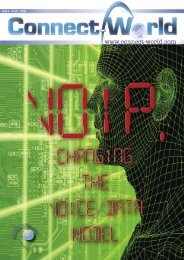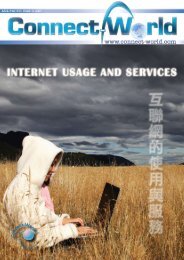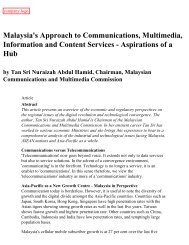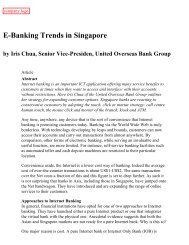Contents - Connect-World
Contents - Connect-World
Contents - Connect-World
You also want an ePaper? Increase the reach of your titles
YUMPU automatically turns print PDFs into web optimized ePapers that Google loves.
Industrial Development<br />
ICT and New India<br />
by Mr Sudhir Rao, Managing Director, Bartronics India Limited<br />
Today, due to governmental programmes over the years, every Indian can talk to anyone<br />
throughout the world. With mobile telephony, Indias people can keep in touch while on<br />
the move. India is now part of the always connected world. After the technology revolution<br />
of the 1990s, Indian software engineers are working in large corporations around the<br />
globe. Every new technology is available in India within days, and newer, better, more productive<br />
business processes are used in every sphere of business.<br />
Mr Sudhir Rao is the Managing Director of Bartronics India Limited. Mr Rao joined Bartronics to establish<br />
and lead its marketing. He was later named Chief Operating Officer and then Managing Director. Before<br />
joining Bartronics, Mr Rao spearheaded the Indian operations of a software development company. Mr<br />
Sudhir Rao started his career with Tata Consultancy Services (TCS), Mumbai in the Management<br />
Consultancy Division. After TCS, Mr Rao joined a pharmaceutical exports company and then moved on to<br />
work with one of the leading pharmaceutical companies of India.<br />
India has made giant strides in information<br />
and communication technology<br />
(ICT) in the last couple of<br />
decades. The Government of India<br />
started moving the country in the<br />
right direction way back in the 1980s<br />
when a revolution in telecommunications<br />
swept the country.<br />
The Subscribers Telephone Dialing<br />
and International Subscribers<br />
Dialing booths (STC/ISD booths) at<br />
every nook and corner throughout<br />
the country brought much needed<br />
access to every individual. Every<br />
Indian then had access to, and could<br />
if they wish, talk to anyone else<br />
across the world.<br />
With the recent launch of mobile<br />
telephony, the Indian population<br />
now has access and can be in touch<br />
with whomsoever they wish while on<br />
the move. The growth of mobile connections<br />
over the past couple of years<br />
is only an indication of how well the<br />
technology has been understood and<br />
absorbed in this country. With one<br />
of the fastest growth rates in terms of<br />
new mobile users, India is now truly<br />
a part of the always connected<br />
world.<br />
The technology revolution in the<br />
1990s followed the telecommunication<br />
revolution of the 1980s; this second<br />
revolution had a strong emphasis<br />
on building the software skills<br />
among Indias increasingly young<br />
population. Today, as a result of this<br />
building of software skills, Indian<br />
software engineers are working in<br />
every large corporation across the<br />
world. Their skills, ability to grasp<br />
new concepts, and hardworking<br />
nature are much sought after everywhere.<br />
Every new technology that is<br />
launched worldwide is now available<br />
in India in a matter of days. The<br />
prime reason this change has taken<br />
place over the past few years has<br />
been largely due to the countrys<br />
urgent need to convince advanced<br />
countries everywhere to outsource<br />
their programming and other technological<br />
requirements to India.<br />
Today, every leading software and<br />
hardware company has a representation<br />
in India often as an Offshore<br />
Software Development Centre or a<br />
Training, Research and Development<br />
Centre. Microsoft and Oracle, among<br />
others, have opened up large development<br />
and research centres in India<br />
that have contributed to almost every<br />
new product launched by these companies<br />
within the last few years.<br />
Besides making a worldwide impact,<br />
the Indian ICT sector has also been<br />
absorbing new technologies, albeit<br />
slowly. Newer, better and more pro-<br />
28
















